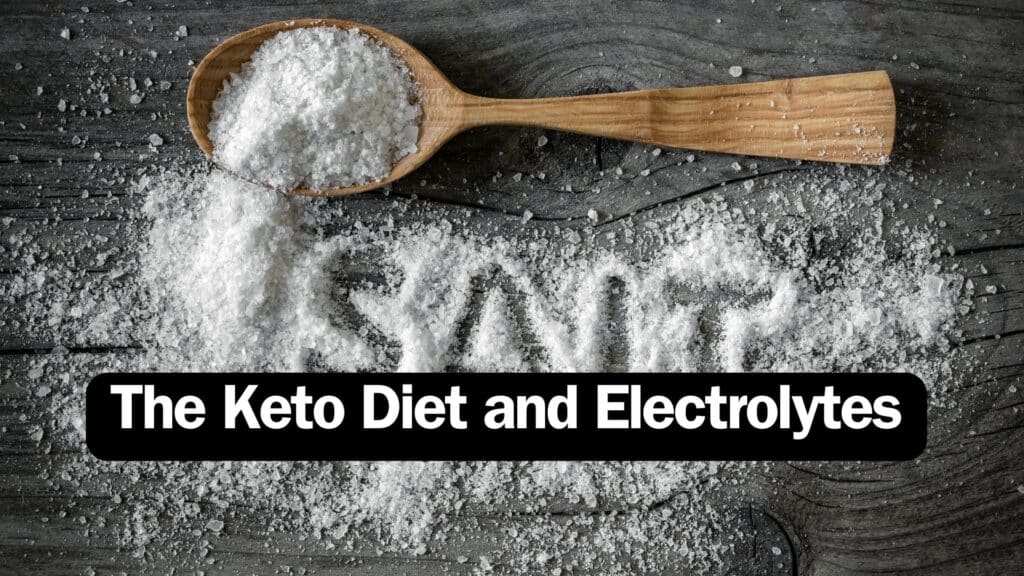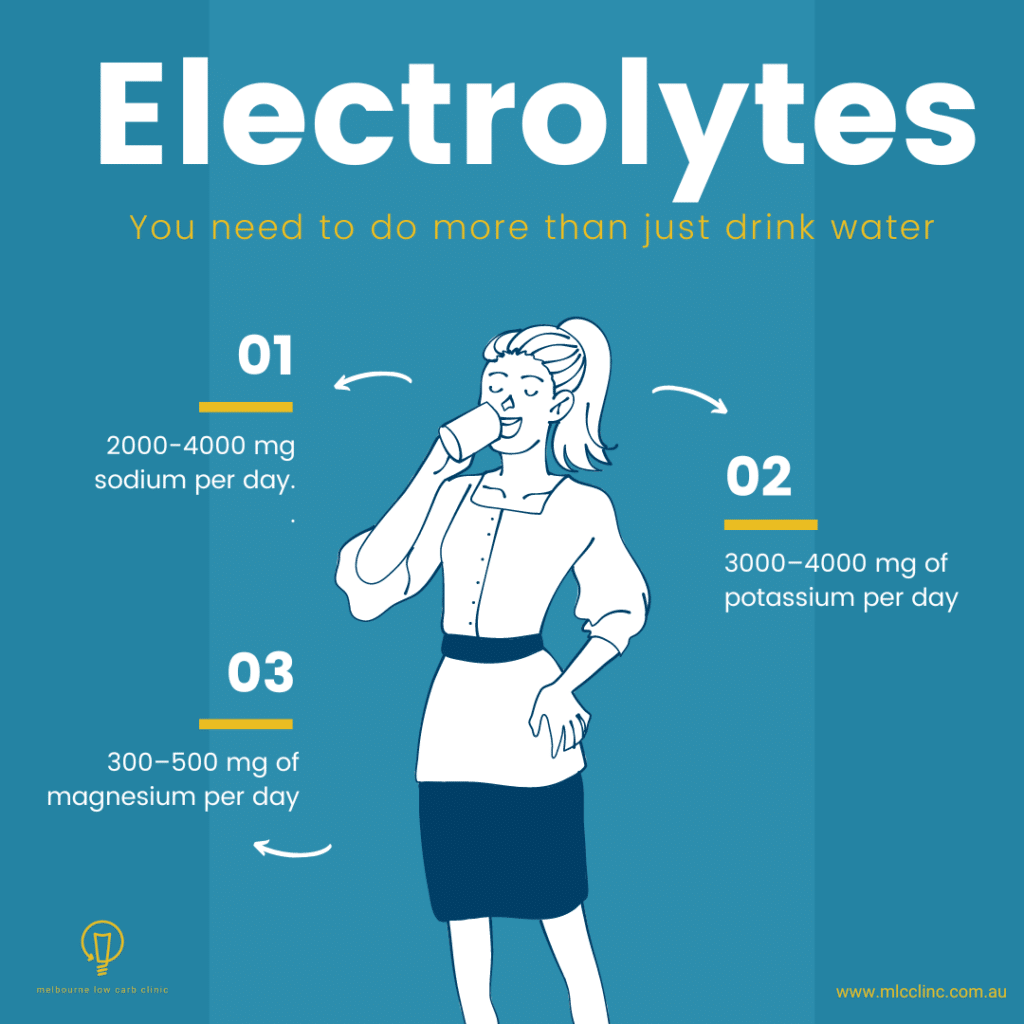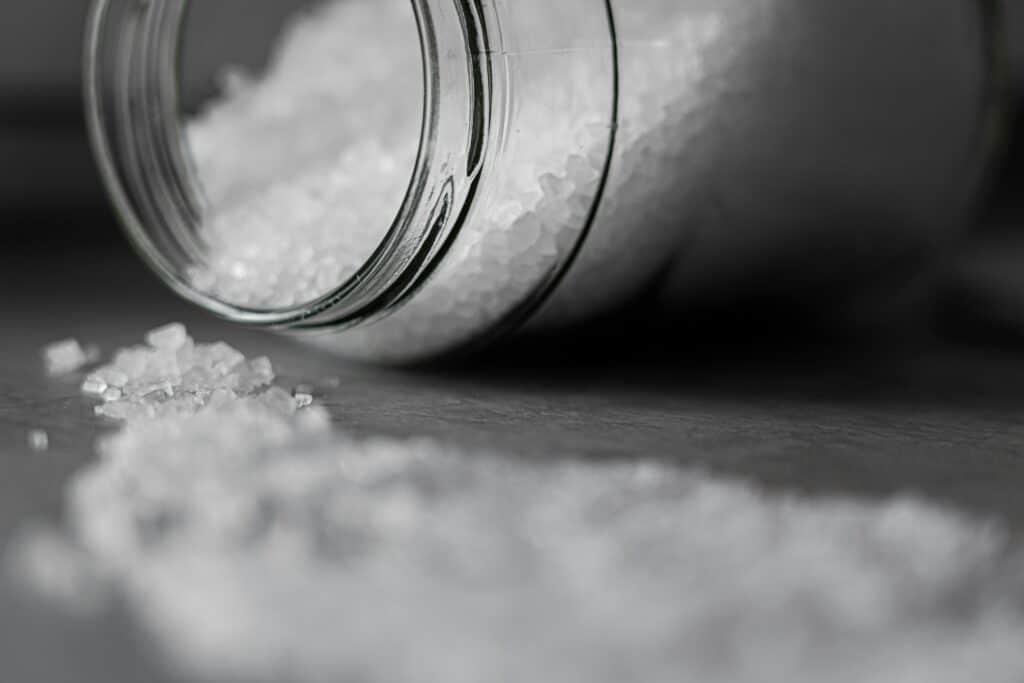- March 17, 2024
- Avi Charlton
- Uncategorized
The Keto Diet and Electrolytes

Starting a low-carb or ketogenic diet can be very super powerful when pursuing a weight loss journey and improving your health and chronic conditions. However, it is essential to take note of your salt intake and electrolyte balance, especially in the beginning of this journey. This blog will walk you through the significance of maintaining electrolyte balance, so you can make better choices in your lifestyle.
What Are Electrolytes and Why Are They Important?

Your body uses minerals referred to as electrolytes, which have an electrical charge. They are essential for bodily functions, including preserving electrolyte balance, energy production, nerve signalling, and muscle contractions. The vital electrolytes are sodium, potassium, and magnesium. Shifting from a standard high carbohydrate diet to a low-carb or ketogenic lifestyle makes massive changes to your bodily function, especially in the way it handles electrolytes. It is important to keep an eye on your salt consumption so you would not compromise your fitness and assist in weight loss.
The Crucial Role of Salt in Low Carb Diets

When you begin a low-carb or ketogenic diet, there are many changes in fat and carbohydrate metabolism. There are large shifts in how your body handles electrolytes, particularly sodium. There’s a lot more sodium in processed foods. Also, carbohydrates in food wants your body retain sodium. When you reduce carbs, the reduction in insulin levels also causes your kidneys to excrete more sodium.
Electrolytes Balance - Key to Avoiding the Keto Flu
Many people experience the “keto flu,” a group of symptoms that includes headaches, exhaustion, and cramping in the muscles that are frequently caused by electrolyte imbalances when they begin a low-carb or ketogenic diet. As your body adjusts to burning fat rather than glucose, it changes how it stores electrolytes like magnesium, potassium, and salt.This adjustment can result in an imbalance, leading to the uncomfortable symptoms we call the “keto flu”. Properly managing your electrolyte consumption can assist in mitigating these symptoms, making the transition to a low-carb lifestyle smoother.
To keep electrolyte balance and fight the keto flu, it’s important to eat an appropriate amount of key electrolytes with a healthy diet or dietary supplements. Increasing your salt consumption can assist in compensating the increased sodium excretion, while consuming excessive potassium and magnesium can help keep essential electrolyte stability. Staying hydrated is prime. However, it is important to calculate the appropriate water consumption with electrolytes to avoid diluting them in your frame. Monitoring how your body reacts to those modifications and contacting a healthcare professional if symptoms persists is important when persueing a low-carb lifestyle for weight-loss.
Minerals, Symptoms of Deficiency and Recommended Daily Intake
| Sodium | Potassium | Magnesium |
Symptoms of deficiency | Fatigue Weakness Headaches Difficulty concentrating | Muscle cramps Muscle twitching Heart palpitations | Muscle cramps Muscle twitching at night or after exercise |
Recommended daily intake | 2000-4000gm/ day 1-2 tsp of salt | 3000-4000gm/day | 300-500gm /day |
Foods that contain | Table salt Bone broth | Dark chocolate Avocado Leafy green Mushrooms Broccoli Meat Hemp seeds Almonds Salmon
| Hemp seeds Avocado Leafy greens Pumpkin seeds Chia seeds Mackerels Almonds |
How Much Salt Do You Need?
Finding Your Salt Balance
The amount of salt to take is not a one-size-fits-all. It depends on different factors, including your normal fitness, the intensity of your physical activities, or even the weather (as sweating can also result in electrolyte loss). While standard recommendations advise ingesting more salt intake than what is commonly advocated, this needs to be approached with mindfulness and care.
For most people on a low-carb weight loss lifestyle, I would suggest to aim each day
- Sodium – 2000-4000gm (1-2 tsp)
- Potassium – 3000-4000gm
- Magnesium – 300-500gm
However, this could range extensively based on circumstances. For instance, if you’re an athlete or a person who engages in prolonged or strenuous activities, you may need extra to compensate for the extra electrolyte loss via sweat.
Consulting with Healthcare Professionals
The importance of consulting with a healthcare professional cannot be stressed enough. We can provide guidance tailored to your individual situation, ensuring we provide tailored individualised medical advice. In a small percentage of individual, we do notice they suffer from salt-sensitive hypertension, heart disease or kidney disease. Also patients on certain medications also needs to have their electrolyte supplementation adjusted. It is important for the individuals to consult their doctor to monitor this.
Simple Tips to Maintain Electrolyte Balance

Add Salt to Your Meals:
Do not be afraid to season your dishes. Adding salt can help replenish sodium levels, which are necessary for electrolyte stability.
Consume electrolyte-rich ingredients:
Incorporate ingredients high in potassium, magnesium, and calcium, including greens, nuts, seeds, and avocados, to assist with electrolyte balance.
Discover more electrolyte-rich ingredients to incorporate into your diet
Stay Hydrated:
Drink lots of water; however, don’t forget that too much can dilute your electrolytes. Balance is crucial.
Consider Supplements:
Dietary supplements with sugar-free electrolytes may be beneficial if you find it tough to get enough electrolytes through a weight loss program. Choose notable products and discuss them with a healthcare professional.
Do You Need an Electrolyte?
While you can obtain the essential electrolytes through a whole food, mineral rich diet, sometimes it can be helpful to purchase commercial sugar-free electrolytes to assist with your weight-loss journey.
I suggest a sugar-free electrolyte, for example Sodii electrolyte.
Each serve contains:
- 1000mg sodium
- 210mg potassium
- 70mg magnesium
Use code AVICHARLTON for 15% off, and I get 10% commission
Conclusion | Keto Diet and Electrolytes
Keeping an eye on your salt and electrolyte consumption is important especially when starting a low-carb or ketogenic weight-loss lifestyle. Understanding the importance of these minerals and putting them into practice to maintain a healthy balance will enhance your weight loss. Remember, every person is different, so tailor those guidelines to your individual needs and seek professional advice when necessary.
Start your low-carb journey with confidence in yourself, knowing that you have the information to maintain optimal electrolyte stability and optimise your dietary choices. Your health and physical appearance are well worth it!
Click here to explore the short and long term side effects of Ketosis
Are you ready to take the next step to optimise your health? Schedule your consultation today to discuss your goals, address concerns, and craft a personalized plan for success. Don’t delay—your path to a healthier, happier you starts now!
Other pages you may be interested in
Website: Visit https://www.mlcclinic.com.au/ to learn more about our services and resources.
Free Resources: Explore the free resources available on our website: https://mlcclinic.com.au/free-resources/
Social Media:
- Instagram: Follow me on Instagram https://www.instagram.com/dr_charlton_low_carb_gp/
- Facebook: Connect with me on Facebook at Dr. Charlton Low Carb GP
- YouTube: Subscribe to my YouTube channel: https://www.youtube.com/@avicharlton
- Free Facebook Community: https://www.facebook.com/groups/5714367278623084
Contact Me: Have questions or want to get in touch? Feel free to email me at avi.charlton@mlcclinic.com.au
Note: Remember, this podcast is not a replacement for medical advice. Always consult with your healthcare provider for personalized medical treatment.
Don’t forget to subscribe, rate, and review the podcast on your favorite platform. Join our community on Facebook and download your free ebook from the https://www.mlcclinic.com.au/


